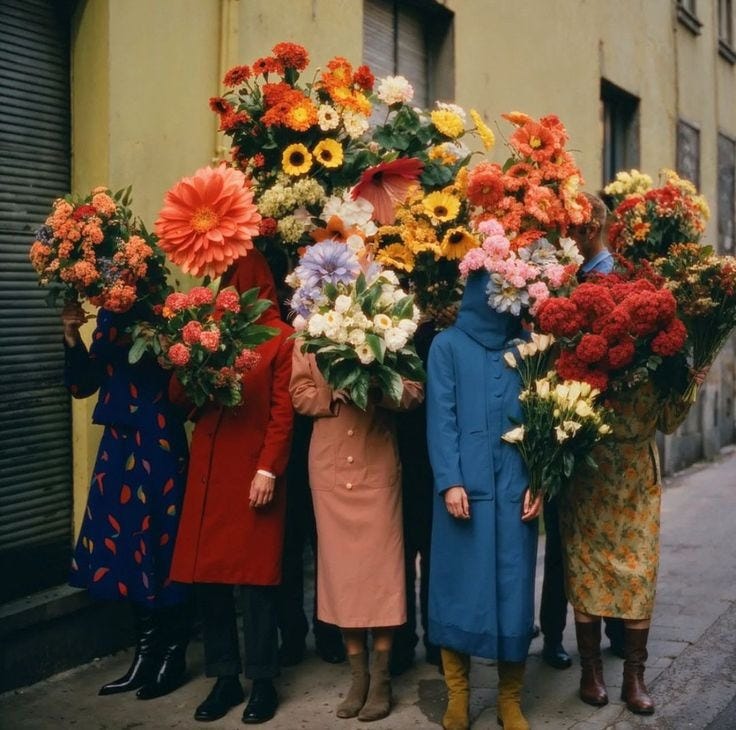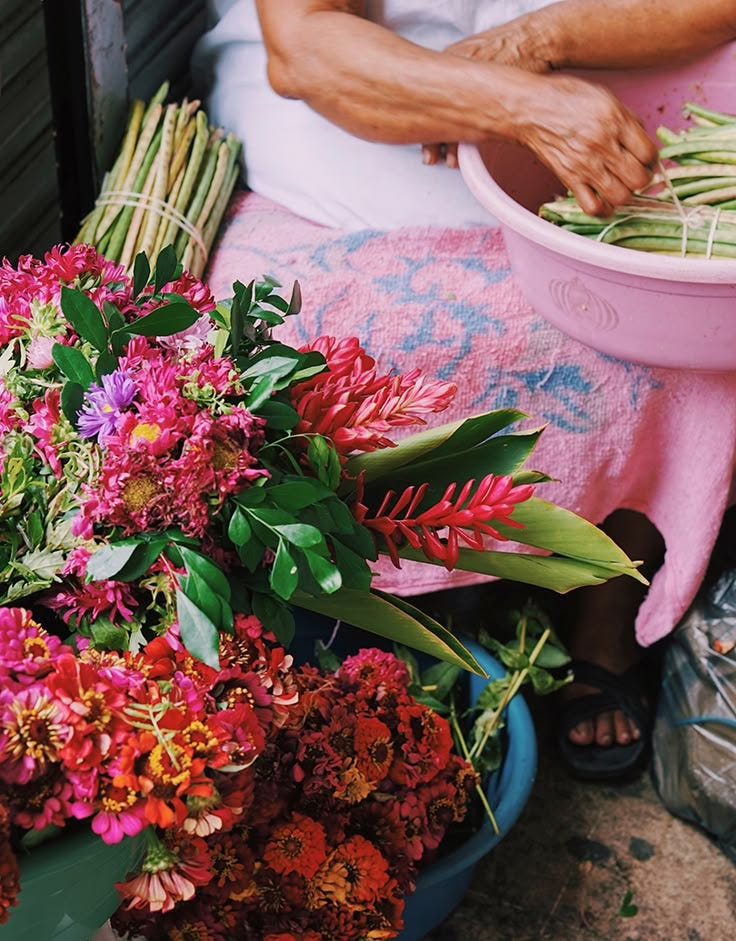Seven years ago I woke up from a dream with a very vivid message: “A woman is a root”. I wrote it down in my journal and did not understand what it meant or why I had dreamed of this, but the phrase haunted me for weeks. In the dream, the phrase had felt so clear, like I knew exactly what it meant, but in my waking life, I remained confused about how to use it. Months later, I completed the phrase with “sisterhood is the mycelium network” and went on to write an essay about the importance of underground movements for women in countries where abortion is illegal. I spoke of the networks of compassion and solidarity created underground, and how much these save lives and provide shelter for so many. But that original phrase remained.
Last week, I facilitated a webinar with Max Dashu, a historian who for 55 years has been researching the suppressed history of women, particularly witches, seers, healers, and sorceresses. In her work, she diligently digs into old customs and tells how European women were uprooted from their culture and hunted for their ways. Dashu goes back to images and old texts to reclaim a history that was lost, whitewashed, and buried under patriarchy and Christianity. As we spoke, it became increasingly clear how important it is for this history to be reclaimed and to go back to these roots.
What happened to women for centuries during the witch hunts has had huge consequences on the way that many women in Europe and the West relate to their ancestry, time, the earth and our relationality with the more-than-human.
What happened during those years was a severing of a culture that cherished the earth and its wisdom, passed from mother to daughter, of women who sang to plants for medicinal purposes, who followed the cycles of the moon and sang to the rivers. Immediately, something happens in my body as I write this; I feel that I cannot be taken seriously, an inner dismissal of this history as insignificant. I believe that the violence that was perpetrated towards women at that time forced many to “kill” that knowledge within them in order to survive. And we bear the consequence of that.
Something also happens in my body when I hear of what happened to women in this time, of how savage and systematic the hunting, persecuting, and often executing of women who were healers and seers. It is a rage that feels ancestral and it comes from a place deep inside my body.
Years ago I had a conversation with an indigenous woman named Aura Cumes who told me that I and so many other women had forgotten. She said it was important to dig into our own history and ancestry to reclaim the roots of “that culture”. She told me that, for her, the same forces of evil that came to colonise and pillage their homes and massacre her people were the same forces that were hunting and killing women in Europe. She called it a genocidal and femicidal patriarchal force. She kept saying “Las mujeres blancas se han olvidado de esto”. This is why people like Dashu play such an important role in trying to reclaim this history and its roots.
When retelling the history of her people, the Mexicans of the Aztlán (now South Texas), and the violence they faced from the gringos, Gloria Anzaldua says “The Gringo, locked into the fiction of white superiority, seized complete political power, stripping Indians and Mexicans of their land while their feet were still rooted in it”, she continues “we were jerked out by the roots, truncated, disembodied, dispossessed, and separated from our identity and our roots”.
Every oppressed person has been uprooted in some way, and the only way back to themselves is to reclaim those roots.
Often, people who have been victims of systemic oppression and violence—whether due to their gender, race, ethnicity or sexual orientation—tend to develop a hatred of their very essence, as they have been violently conditioned to see themselves through the lens of their oppressors. I believe this internalised hatred is not merely a consequence of subjugation but a method of survival, a way to navigate a world that continuously devalues and erases their existence.
So, what does it mean to root into a place when one has been so irreparably distanced from their essence? The answer lies in the roots. This is what radical work means: to reclaim roots or create new ones. The word itself means the root or ground;" of body parts or fluids, "vital to life," from Latin radicalis "of or having roots," from Latin radix (genitive radicis) "root" (from PIE root *wrād- "branch, root"). The basic sense of the word in all meanings is "pertaining or relating to a root or roots," hence "thoroughgoing, extreme." The figurative meaning "going to the origin, essential" is from 1650s.
The women of Europe were uprooted from their environment, severed from a connection to the Earth so profound that it had shaped their very identity. That identity was not only lost but excised from history, stripped away as if it had never existed. To lose one's roots is to lose one's sense of self, the culture that nourished it, and the bond that once anchored it in place. This centuries-old amnesia must be confronted and reclaimed.
Yet, many attempt to fill this void by appropriating the spiritual practices of other cultures rather than rediscovering their own. This is why the work of Max Dashu is so vital—it calls on us to reclaim our heritage with integrity. We can learn, study, and observe other cultures, but true restoration comes from reconnecting with our own forgotten ways of being, and not from practising other cultures’ ways (like cacao or ayahuasca ceremonies devoid of this integral research). It is extremely important to be aware and respectful of the history and culture of others, or it is simply perpetuating that very violence .
Today, for the first time in 10 years I am not marching in the streets of Barcelona for Women’s Day. Throughout these years I have learned so much about approaching this work (of feminist research, practice, and writing) with nuance and intersectionality, to hold my tongue when it is not my place, and to respect the different struggles of women, understanding my privilege within the movement. Much of my work on feminism has been reading texts, listening to other women, making mistakes, and constantly checking my privilege.
I spent today studying my motherline and listening to the wisdom of Sylvia Lindsteadt about Old Europe, of Chiara Baldini and her stories of Minoan Crete, and reminiscing my conversation with Max Dashu. I decided that even if I was not in the streets protesting with my sisters, I could do radical work and that this reclaim of roots is something as important as everything else, as it may forge a completely different knowledge in the meanders of my mind and heart.
Every year, I write a message for this day. Today, it is this:
May we live in a world where we rise rooted, where our inner worlds weave complexity where the superficial lies. May all bodies be free, to express and love in the way they want. May we understand that oftentimes what lies in our history is the answer that we have been seeking, that our roots long to be fed, their stories etched in the soil of our belonging. May we be aware of the soil we stand on and who it also belongs to, may we hear the voices of those before us, whispering their tales to form our identities. We are made of everyone that came before us, may we know how interconnected we truly are. And in times of great darkness, may we find eachother and offer kindness.
An elder told me the other day that love truly is the only thing that counts, the rest can all be figured out. And what is love if not the root of our existence? May we reclaim those roots until they become visible to our story.
ps. I want to say that this journey does not come without errors, that I keep making mistakes and remain open to being corrected along this path, to listen to other’s experiences and the way my words and ways may impact them. All I can do is remain open to the nuance that Change requires.
If you want to take the courses by Sylvia Linsteadt on women’s history in old Europe, and Max Dashu’s course about the Secret History of The Witches on advaya (link here), you can get 10% off by using WAVES-10 at checkout.
Below, find a short exercise and some resources so you can dig deeper into the work. (only for paying subscribers)
Keep reading with a 7-day free trial
Subscribe to Waves to keep reading this post and get 7 days of free access to the full post archives.






